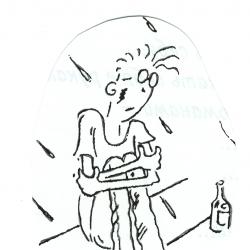Subordinating conjunctions in German. Relative clauses in German Sentences with wenn
I.G. Knyazeva, teacher of German, MBOU secondary school No. 15 st. Rogovskoy
Compound sentences in German
(complexity grade 11)
A compound sentence in German (Satzreihe) consists of two or more independent sentences combined in meaning. In compound sentences, the connection between sentences can be allied and non-union.
Der Vorgang ging auf, die Auffűhrung begann.
Gestern wollten wir einen Ausflug machen, aber es regnete den ganzen Tag und wir mussten zu Hause bleiben.
The main means of communication between sentences in German are the coordinating conjunctions: und (and, a), aber (but, however), denn (since, because), oder (or, either), sondern (a, but), sowie (as well as), as well as adverbs with temporary, investigative and other meanings: dann, danach (then, then, after that), doch (after all, nevertheless), jedoch (however, nevertheless), deshalb (because), deswegen (therefore, for this reason), darum (therefore), also (so, therefore, therefore), sonst (otherwise), dabei (besides, at the same time), dazu ( beyond that, beyond that), zwar (true, though), und zwar (namely), űbrigens (however), auβerdem (besides), trotzdem (despite this).
The word order in the compound sentences of the German language that is part of it depends on the union or allied word.
Most coordinating conjunctions do not affect word order. These include unions: und, aber, auch, denn, oder, sondern.
Die Eltern gehen ins Theatre, aber
ich bleibe zu Hause.
Word order is influenced by conjunctions and conjunctions - adverbs: darum, deshalb, deswegen, dann, trotzdem, zwar, sonst, dabei, dazu, űbrigens.
For example: Meine Schwester erzählte mir sehr viel von diesem Film, deshalb möchte ich mir ihn ansehen.
Im Foyer betrachteten sie die Bilder der Schauspieler, dann gingen asie in den Zuschauerraum.
Conjunctions that allow fluctuations in word order: doch, jedoch, also. For example: Sie ist schon 80 Jahre alt, doch arbeitet sie bis heute im Theater.
Conjunctions that do not affect word order |
und (and, a), aber (but, however), denn (since, because), oder (or, either), sondern (a, but), sowie (and also, like), nicht nur ... sondern auch (not only ... but also), sowohl ... als auch (both ... and) |
|
Conjunctions, unions - adverbs that affect word order |
deshalb (because), deswegen (therefore, for this reason), darum (therefore), auβerdem (besides), trotzdem (despite this), zwar (true, though), und zwar (namely), halb … halb, teils ... teils (that ... that) |
|
Conjunctions that allow fluctuations in word order |
doch (after all, nevertheless), jedoch (however, nevertheless), also (so, therefore, therefore), entweder ... oder (or ... or), weder ... noch (neither ... nor) |
There are different ways to express time in German. If some event or action (action) took place in the past only once, then the German union " als", For example:
- Als Thomas Sarah sah, war sie schon zu einer Tasse Kaffee eingeladen. - When Thomas saw Sarah, she was already invited for a cup of coffee (in the past, a single action).
- Als unser Vater nach Hause kam, war das Abendessen schon fertig. - When our father came home, dinner was already ready (in the past, a one-time act.).
When actions or phenomena are not inherent in a single character, and they occur repeatedly, the German union " wenn", For example:
- Immer wenn Thomas Sarah sah, war sie schon zu einer Tasse Kaffee eingeladen. - Whenever Thomas saw Sarah, she was already invited for a cup of coffee (in the past multiple action).
- Jeweils wenn unser Vater nach Hause kam, war das Abendessen schon fertig. - Every time our father came home, dinner was already ready (in the past - multiple actions).
- Wenn er eine günstigere Lösung findet, muss er sich bei uns melden. - When he finds a better solution, he must inform us (in the future - a single action).
- Wenn er Fehler findet, muss er uns sofort darüber informieren. - When he finds errors, he must immediately inform us about this (in the future - multiple actions).
- Wenn du das erforderliche Spielzeug findest, sage mir Bescheid. – If you find the right toy, tell me (future one-time action).
- Wenn Barbara in der Schule frühstücken wird, müßt ihr das bezahlen. – If Barbara has breakfast at school, you have to pay for it (multiple action in the future).
There are such speech situations when a thought can be expressed without using a subordinate clause. In such situations, subordinate clauses are replaced by the words " meanwhile – inzwischen” or “then - dann”, which, as a rule, take on the functions of secondary members and require the use of reverse word order in sentences (otherwise, they take places after the main members within statements), for example:
- Zuerst kam Holger an, danach kann sein Neffe. “First Holger arrived, and then his nephew arrived.
- Zunächst hat unser Chef diese Entscheidung getroffen, dann verstand er seinen Fehler. – At first, our boss made this decision, and then he realized his mistake.
- Seine Kollegen führten alle Versuche durch, inzwischen bekam unsere Vertriebsabteilung neue Vorschriften. “His colleagues have already carried out all the tests, and in the meantime our sales department has received new regulations.
- Alle Familienangehörigen waren gerade beim Abendessen, da klopfte jemand an der Tür. All family members were just having dinner when someone knocked on the door.

In addition to the aforementioned unions, “wann” can also be used to express temporary relationships - interrogative pronoun, For example:
- Wann bekomme ich meinen Stempel? When will I receive my stamp?
- Jennifer weiß nicht, wann sie ihren Koffer bekommt. Jennifer does not know when she will receive her suitcase.
Between "wann" and "wenn" there is a definite difference, and they should not be confused. When the moment at which the event will occur is unknown, "wann" is used, for example:
- Die Kinder wissen nicht, wann der Spiel beginnt. The children do not know when the game will start.
- Wisst ihr, wann wir die nächste Lieferung bekommen? Do you know when we will receive the next shipment?
Subordinate (adj.) sentences (preposition) are dependent prepositions that are not used without the main clause.
The characteristic features of adj. suggestion are:
- Special arrangement of words
- The inseparability of separable prefixes of such sentences;
- Inclination (conjunctiva);
- Subordinating conjunctions link two sentences.
Adverbial preposition. Maybe:
Stand after the main Meine Tochter sagt, dass sie die Hausaufgabe gemacht hat.
(My daughter said she did her homework)
Stand in front of the main Während wir in Köln wohnten, sprachen wir nur Deutsch.
(During the time we lived in Cologne, we only spoke German)
To be inserted into the main Der Kino, der ich gesehen habe, hat beendet.
(The movie I was watching is over)
Word order in a subordinate clause (Wortfolge im Nebensatz):
1) General order: Ich ärgere mich, weil du das Brot nicht gekauft hat.
(I'm mad because you didn't buy bread)
From this we see that the main proposition remains unchanged, but the words are in the following order:
2) Unions and words are always at the beginning of the adj. prepositions. An exception are prepositions that can be placed before relative pronouns (loc.). Then comes the subject.
Example: Ich erkannte, mit wem ich nach Perm fahre. (I found out with whom I will go to Perm)
3) The modified verb is in the very last place. He also has the inseparability of the prefix.
For example: Er erfuhr, dass du fortgefahren bist. (He found out that you left)
4) The penultimate place will be occupied by the invariable part of the predicate
Du hast vergessen, dass er dir gesagt hat. (You forgot what he told me)
Ich finde, dass du sehr nett bist (I think you are very pretty)
5) Return seats. sich is written after the subject, expressed by a personal place, with the pronouns man and es.
Example: Ich habe gehört, dass er sich zum Ausflug verspätet hat. (I heard that he was late for the flight)





First of all, you need to indicate the conjunctions that form additional subordinate clauses and relative clauses of reason:
- ass- what
- ob- whether
- weil- because
- da- as
And now the fun begins. In the main clause, everything is as usual, but in the subordinate clause, the word order changes in a special way. The subject comes right after the conjunction, and the inflected part of the predicate takes the last place:
- Ich weiß, dass er in zwei Wochen nach Deutschland fahrt. - I know that he is going to Germany in two weeks.
- Ich möchte wissen, ob wir am Samstag Unterricht haben. - I would like to know if we have classes on Saturday.
- Sie kommt heute nicht, weil sie krank ist. - She won't come today because she is sick.
It looks even more original if a complex tense form, a construction with a modal verb, etc. appears in the sentence:
- Ich weiß, dass er vor zwei Wochen nach Deutschland gefahren ist. - I know that he left for Germany two weeks ago.
- Ich weiss nicht, ob sie das Auto gekauft haben. - I don't know if they bought the car.
- Sie lernt Englisch und Deutsch, weil sie zwei Fremdsprachen beherrschen will. - She studies English and German because she wants to speak two foreign languages.
If we compare this with the direct word order: "Er fährt ...", "Sie ist ...", "Sie will ...", then you can see the frame construction, where the frame is formed by the subject (at the beginning of the subordinate clause) and " predicate set from "(at the end).
The negation in the subordinate clause comes before the predicate or before the invariable part of the predicate - in a word, not in the last place, because the last place is always “reserved” behind the invariable part of the predicate:
- Ich habe gehört, dass er nach Deutschland nothing fart. - I heard that he is not going to Germany.
- Ich habe nicht geantwortet, weil ich diese E-Mail nothing bekommen habe. - I didn't reply because I didn't receive that e-mail.
Separable prefixes and verb components in subordinate clauses are not separated:
- Ich denke, dass ich mitgehe. - I think I will go with you.
- Wir wissen nicht, ob er mitfährt. - We don't know if he's coming with us.
- Ich habe die Lampe ausgeschaltet, weil ich fernsehe. - I turned off the lamp because I am watching TV.
The reflexive pronoun sich is in the subordinate clause after subject, if the subject is expressed by a pronoun:
- Ich habe gehort, dass Sie sich mit diesen Problemen beschäftigen. - I heard that you are dealing with these issues.
But if the subject in the subordinate clause is expressed by a noun, then sich usually stands front subject to:
- Ich weiss, dass sich unser Freund mit diesen Problemen beschäftigt. - I know that our friend is dealing with these problems.
Additional subordinate clauses can be introduced not only with the union dass, but also with a question word:
Ich habe nicht gehort, was er gesagt hat. - I didn't hear what he said.
Ich weiss nothing, wann er commt. - I don't know when he will come.
Konnen Sie erklaren, warum Sie sich immer verspaten? - Can you explain why you are always late?
Wissen Sie, Herr Doktor, was ich heute Morgen geschossen habe? - Do you know, doctor, what I shot this morning?
Ja, das weiss ich. Ich habe ihn heute Mittag behandelt. - Yes I know. I looked at it during the day.
play a role in such proposals and pronominal adverbs. They are formed by adding wo(r)- or da(r)- to the corresponding suggestion:
- Erfahrt mit dem Bus. - Womit farther? - Erfahrt damit. - He rides the bus. - What is he driving? – On it (= on the bus).
- Ich interessiere mich fur Fremdsprachen. - Wofur interessieren Sie sich? - Ich interessiere mich dafur. - I am interested in foreign languages. - What are you interested in? - I'm interested in it.
- Sie warten auf den Zug. - Worauf warten sie? - Sie warten darauf. - They are waiting for the train. – What are they waiting for? They are waiting for him (= train).
Pronominal adverbs can introduce additional subordinate clauses:
- Er fragment, wovon ich das weiss. - He asks how I know this.
- Man hat mich gefragt, womit ich mich beschäftige. - I was asked what I do.
Union da - as usually introduces a subordinate clause if it comes before the main one. That is, in this case, all our argumentation begins with the union da. The variable parts of the predicate in the main and subordinate clause tend to each other and are located at the junction:
Da er ein junger Wissenschaftler ist, hat er ein Forschungsstipendium bekommen. - Since he is a young scientist, he received a research scholarship.
Da er dies Stipendium bekommen hat, fahrt er nach Deutschland. - Since he received this scholarship, he is going to Germany.
After unions aber - but, und - and, but, sondern - but, but, denn - because, oder - or, or subordinate clauses use direct word order.
Die Eltern fahren nach Italien fur die Kinder
Parents go to Italy, and aunt will look after the children
Reverse word order
In subordinate clauses after conjunctions darum, deshalb, deswegen, sonst, trotzdem, dann, folglich used reverse word order. That is, the subject and predicate in the subordinate clause are reversed.
Präsens (Present)
Ich habe keines Auto. mit dem Bus zur Arbeit
Ich habe keines Auto, mit dem Bus zur Arbeit
I don't have a car, so I take the bus to work.
Perfect (Past tense)
In this case auxiliary (haben/sein) stand on first place after the union third form verb leaves In the end adjunctive proposal.
Ich hatte keines Auto. mit dem Bus zur Arbeit
Ich hatte keines Auto, mit dem Bus zur Arbeit
I didn't have a car so I took the bus to work
Inversion
In subordinate clauses after conjunctions dass (what), weil (because), wenn (if, when), falls (in case), während (yet), bevor (before; before), nachdem (after so), obwohl (though) - used inversion . That is verb in a subordinate clause goes to the end .
Präsens(Present)
Keynes Auto. Ich fahre mit dem Bus zur Arbeit
I do not have a car. I go to work by bus
Ich fahre mit dem Bus zur Arbeit, keines Auto
I go to work by bus because I don't have a car.
Ich weiss, in der Schule
I know that he is in school
Präteritum (Past tense)
Keynes Auto. Ich fuhr mit dem Bus zur Arbeit
I didn't have a car. I went to work by bus
Ich fuhr mit dem Bus zur Arbeit, keines Auto
I took the bus to work because I didn't have a car.
Perfect (Past tense)
In this case both verbs subordinate clause go to the end , but on last place put auxiliary or any other that was with the subject.
Ich habe ein Auto nicht gekauft. mit dem Bus zur Arbeit
I didn't buy a car. I went to work by bus
Ich habe ein Auto nicht gekauft, mit dem Bus zur Arbeit
I didn't buy a car because I took the bus to work.
If a subordinate clause with a union Wenn stands before the main sentence, the main thing often begins with the words so or Dann :
mein bald, ins Kino
If my friend comes soon, then we will go to the cinema
WENN or ALS
Wenn in the meaning of "when" is used if the action in the main and subordinate clauses occurs simultaneously. Same Wenn in the meaning of "when", used to emphasize multiplicity actions:
nach Moskau, mich unbedingt
When he comes to Moscow, he visits me without fail
Als also translated "when", but used in the past tense when single action:
meine Freundin am Sonnstag im Theater
We met my friend when we were at the theater on Sunday
UM...ZU and DAMIT construction
Union um … zu + Inf. and damit expresses target .
Ergeht nach Deutschland, Deutschland
He is going to Germany to learn German.
Ich schenke ihm ein Lehrbuch der deutschen Sprache, er deutsche Sprache
I give him a German textbook so that he can learn German.
Construction (AN)STATT ... ZU
Anstatt seine Hausaufgaben zu machen, sieht das Mädchen fern
Instead of doing her homework, the girl watches TV
Design OHNE ... ZU
Sie geht, ohne sich zu verabschieden
She leaves without saying goodbye
Inversion with DER(DIE, DAS, DESSEN)
Union der (die, das, dessen, den, dem ) expresses the definition.
Ich fahre in der Stadt, in meine Verwandten
I'm going to the city where my relatives live






